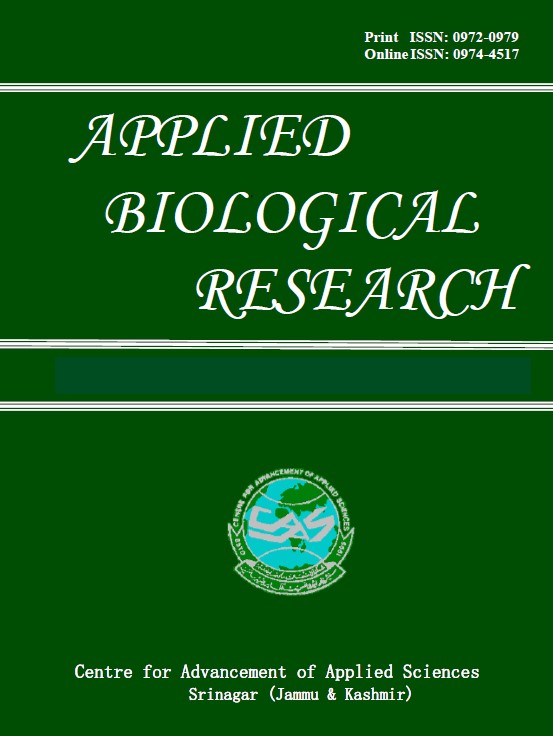Genetic Variability And Association Studies Among Yield Contributing Traits In Gladiolus (Gladiolus Hybridus Hort.) Under Sub-Tropical Conditions Of Punjab (India)
DOI:
https://doi.org/10.48165/Keywords:
Association, gladiolus, genetic variability, path coefficientAbstract
Fifty seven genotypes of gladiolus were assessed for their efficiency with respect to yield and its contributing traits at PAU Ludhiana (Punjab). The higher PCV and GCV estimates were observed for the number of cormels plant-1, weight corm-1and polar diameter of corm. High heritability with high genetic advance was registered for weight corm-1, spike length, number of cormels plant-1, days taken to heading and days taken to open 1st floret. The correlation studies revealed strong positive association of the number of florets spike-1 with the number of leaves, flower duration, spike length, spike diameter, weight corm-1, polar diameter of corm and number of cormels plant-1at both phenotypic and genotypic level. The path analysis indicated that spike length followed by polar diameter of corm and flower duration had highest magnitude of positive direct effect on the number of florets spike-1at phenotypic level, while polar diameter of corm followed by spike length and flower duration had highest direct effect on the number of florets spike-1at genotypic level.
Downloads
References
Anuradha, S. and Gowda, J.V.N. 1994. Correlation studies in gladiolus. pp. 285-287. In: Floriculture Technology, Trades and Trends (eds. J. Prakash and K.K. Bhandary); Oxford & IBH Publishing, Calcutta, India.
Bhujbal, G.B., Chavan, N.G. and Mehetre, S.S. 2013. Evaluation of genetic variability heritability and genetic advances in gladiolus (Gladiolus grandiflorus L.) genotypes. The BioScan, 8: 1515-1520.
Bichoo, G.A., Jhon, A.Q. and Wani, S.A. 2002. Genetic variability in some quantitative characters of Gladiolus. Journal of Ornamental Horticulture, 5: 22-24.
Burton, G.W. 1952. Quantitative inheritance in grasses. pp. 277-283. In: Proceedings of the 6th International Grassland Congress, Aug., 17-23, 1952, Pennsylvania State college, USA. Burton, G.W. and DeVane, E.W. 1953. Estimating heritability in tall fescue (Festuca arundinaceae) from replicated clonal material. Agronomy Journal, 45: 478-481. Choudhary, M., Moond, S.K. and Kumari, A. 2011a. Correlation studies in gladiolus. Research in Plant Biology, 1(4): 68-72.
Choudhary, M., Moond, S.K. and Kumari, A. 2011b. Path coefficient analysis studies in gladiolus. The Asian Journal of Horticulture, 6: 455-458.
Dewey, D.R. and Lu, K.H. 1959. A correlation and path coefficient analysis of component of crested wheat grass seed population. Agronomy Journal, 51: 515-518.
Johnson, H.W., Robinson, H.F. and Comstock, R.E. 1955. Estimates of genetic and environmental variability in soybean. Agronomy Journal, 47: 314-318.
Kumar, P., Maurya, R.K., Chakraborty, B., Mer, R. and Mishra, D.S. 2011. Genetic variability and correlation studies in Gladiolus hybrid L. under Tarai conditions. Annals of Horticulture, 4: 140-146.
Lepcha, B., Naufiyal, M.C. and Rao, V.K. 2007. Variability studies in gladiolus under mid hill conditions of Uttarakhand. Journal of Ornamental Horticulture, 10(3): 169-172. Pal, A. and Singh, R. 2012. Correlation and path coefficient analysis in gladiolus. Annals of Horticulture, 5: 103-107.
Yadava, D.K., Giri, S.C., Vignesh, M., Vasudev, S., Yadav, A.K., Dass, B., Singh, R., Singh, N., Mohapatra, T. and Prabhu, K.V. 2011. Genetic variability and trait association studies in Indian mustard (Brassica juncea). Indian Journal of Agricultural Sciences, 8: 712-716.

